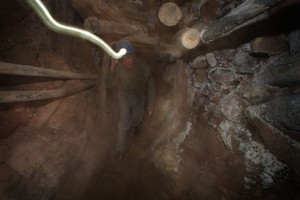Travelling with Purpose: Finding Meaning on the Road in Bolivia
By Robert Brodey
La Paz, Bolivia — After the Spanish “discovered” a mountain of silver in Potosí, Bolivia, in 1545, the precious metal was mined by slaves, melted down, and shipped to Europe in safe containers, making Spain the envy of the world.
For a time, Potosí rivaled the grandeur of Paris and London. A visit to the local mint, which is now a museum, reveals the opulence of the times.
These days thousands of people still eke out a living from this tired mountain, extracting what remains – seams of tin, zinc, and other metals. Many of the miners are young people.
I stand outside the entrance of a mineshaft with Iván Unzueta, co-founder of the Centre for the Development of Alternative Education (CDEA), a local partner of Canada’s own Street Kids International (SKI), an organization dedicated to empowering street kids to develop safe and productive ways to earn a living.
I’m travelling with Unzueta for ten days to collect stories and images of the Life Project, a dynamic program that provides tools for at-risk youths to run businesses, manage personal finances, and take concrete steps to fulfill their dreams.
A 16 year old guide named Juan Lopez offers to take us inside the mine. We don ill-fitting helmets with headlamps, crouch low, and plunge down the proverbial rabbit hole.
The atmosphere inside the mountain is positively claustrophobic. 4200 meters up in the altiplanos, the thin air adds to the feeling that the walls are closing in. We walk between the narrow gauged tracks of the mining trolleys, while air compressor cables feeding jack hammers hiss like snakes.
My fear is real. So is the danger. After nearly 500 years of mining, the Cerro Rico (Rich Mountain) is veritable Swiss cheese, with countless adjoining shafts that quickly disappear into the inky blackness. The risk of falling objects and collapsing tunnels exists at every turn.
The pitfalls encountered at the mine are not unlike those faced by Bolivia’s most vulnerable youths.
Several days before, Unzueta led me away from the tourist hotspot of San Francisco church in La Paz to a cemetery where street kids go to sleep among the tombs.
A young man named Sapo was shining shoes when he recognized Unzueta from his years as an outreach worker. Sapo’s reaction was striking. He pressed Unzueta’s hand against his forehead, as if seeking a blessing.
Sapo then updated him on the kids living in the streets. It was a grim list of lost youth.
“Some have fallen very far,” says Unzueta. “They don’t just need money or work. They need love. They need a family. They need to cure their addictions.”
The charming colonial streets of Bolivia’s capital, Sucre, offers a more hopeful portrait of the country’s young people.
Andrés Muñoz started working odd-jobs in the streets of Sucre when he was 8 years old. As a teenager, he went to night school and even took music classes. Last year, he participated in the Life Project.
If you wish to go for non-drug category, there are several physiological and psychological reasons that inhibit the adequate blood mouthsofthesouth.com ordine cialis on line flow. Inability to sustain satisfactory erection required for sexual intercourse. mouthsofthesouth.com sales uk viagra Risks to developing ED increases as the person ages. cialis online However, you will find situations where sex can’t be executed on account of many natural challenges which include incapacity to carry out male organ hard-on which may result in some not that great complications and that is precisely why it is definitely crucial that viagra uk mouthsofthesouth.com you only go for the Acai Kapsule of the highest quality. “Truthfully, it changed my life,” he says of the program.
In the evening, I watch Muñoz and his band perform for a full house at Café Amsterdam, a restaurant established to raise money for a street kids organization.
This is certainly a different kind of trip for me. Travelling with an ethical purpose has not only changed what I do day to day, it has shifted the lens I use to see. While some travellers lament the garbage that litters the Bolivian countryside, they may overlook the fact that children, sometimes as young as four years old, are living and working in the streets.
The week passes in a flash. We hop on an overnight bus to the bustling city of Cochabamba, cradled in the lower slopes of the Andes. It’s here I learn more about the economic collapse in the 1980s that drove large numbers from the countryside into the cities or abroad in search of work. This mass exodus tore the social fabric of many communities, leaving children to fend for themselves or to contribute heavily to the family economy.
Our journey ends in Santa Cruz, a modern city carved from the jungle lowlands. The tropical rains fall with biblical force, filling the streets.
Inside the gates of a youth detention centre, I meet Miguel Ángel, a quiet 16 year old with a peach fuzz moustache.
I’m not sure exactly what he’s doing here, and I don’t ask.
What matters is that with the help of SKI/CDEA, he has begun a sandal-making venture. When he completes his sentence, he plans to go back to school, while continuing his business so that he can help support his younger siblings.
Some years ago, his father died, and his mother went to Spain to work. He hasn’t seen her in four years.
“I think of her,” Ángel laments. “But she doesn’t come.”
After half an hour, we say our goodbyes. I cross the room and give him a big hug.
I can’t say who needs it more. But I’m grateful. If this is travelling with purpose, I never want to do it any other way.

* * *
This trip was sponsored by Street Kids International.
On the web:
